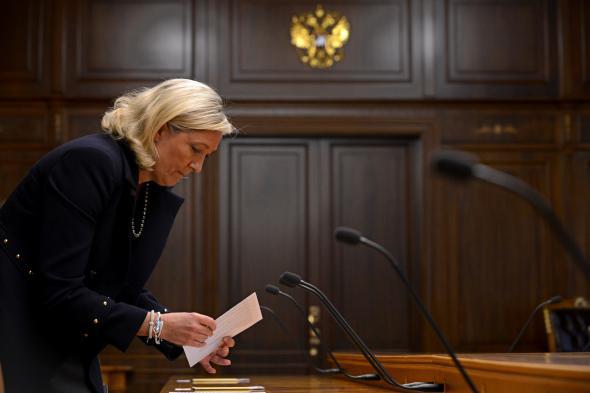Elections for the European parliament are scheduled for alter this week, and far-right parties, many of which are deeply skeptical of the EU itself, are expected to significantly increase their representation in the body, which now enjoys significantly more power to set regulations and approve international agreements.
Griff Witte of the Washington Post suggests that one of the major beneficiaries could be the EU’s primary antagonist of the moment, Vladimir Putin.
“Voters appear poised to reward parties that make no secret of their fawning admiration for the way the Russian leader has defied the West and dismembered Ukraine,” he writes. “The result could deliver a fresh blow to what has already been a foundering European effort to take a tough and united line against Russia.”
It’s not hard to find examples of this admiration. As Anton Shekhovtsov, an expert on the European far right, notes, Marine le Pen of France’s National Front is a frequent visitor to Moscow, where she has had meetings with Putin’s senior advisers. Gabor Vona, leader of Hungary’s nationalist, anti-Semitic Jobbik party, argues that it would be better for his country to leave the EU and join the Russian-led Eurasian Union. Bulgaria’s far-right Ataka party launched its European election campaign in Moscow. Andreas Molzer of Austria’s Freedom Party praised Putin for having “managed to steer the post-Communist, crisis-ridden Russia into calmer waters.” Italy’s National Front praised Putin for his “courageous position against the powerful gay lobby” and put up posters around Rome last year saying “I agree with Putin.”
Nigel Farage of Britain’s Euroskeptic UKIP party, has also called Putin the world leader he most admires, though he specified that was “as an operator, but not as a human being,” noting that he does not approve of jailing journalists. In a televised debate last month, Farage said that the EU has “bloody hands” over the crisis in Ukraine.
Putin’s appeal to these parties is fairly obvious. He combines cultural conservatism with a strong belief in state sovereignty and, perhaps most importantly, he’s a perennial thorn in the side of the EU.
I think it’s possible to overstate the connection here. Historian Timothy Snyder wrote in the New Republic last week that Putin “now presents himself as the leader of the far right in Europe” and that a “vote for Strache in Austria or Le Pen in France or even Farage in Britain is now a vote for Putin, and a defeat for Europe is a victory for Eurasia.”
I think it’s safe to say that far-right voters, and indeed most far-right politicians, in Europe are motivated less by events in Ukraine, Eastern Europe, or Syria than by domestic concerns over the economy and immigration. There doesn’t seem to be any conspiracy here. With the combination of a devastating economic crisis and an uptick in immigration, the far right has plenty of ammunition without any Russian involvement.
And as former German Chancellor Gerhard Schroeder demonstrates, fawning support for Putinism is hardly limited to the far right.
But it’s fair to say that with important debates over sanctions on Russia and a planned trade pact with the United States coming soon, dissension in the ranks in Brussels is probably to Russia’s long-term advantage.
